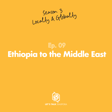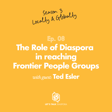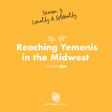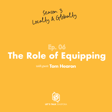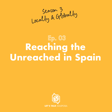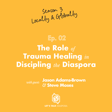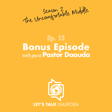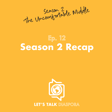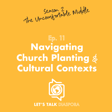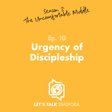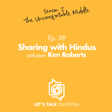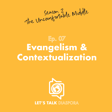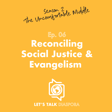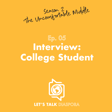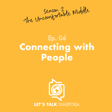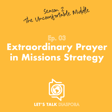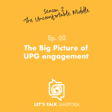Opportunities in North America
00:00:02
Speaker
Are you a pastor, ministry leader, or volunteer? Perhaps a stay-at-home parent, business executive, or college student. Do you desire to see the nations come to faith in Jesus Christ? Let me tell you something fascinating. Something that is happening in our lives that's never happened before. The nations are coming to us.
00:00:23
Speaker
Yes, where we once had to travel across the world to share the gospel, the nations are now coming to North America through means of business, tourism, university study, and more. The world's most unreached people groups are coming to us. The next best question to ask?
00:00:42
Speaker
How do we reach them with the gospel? I want to introduce you to a missions organization called Global Gates. Global Gates exists to reach the ends of the earth through Global Gateway Cities. You too can be involved in this mission from wherever you are. Simply go to globalgates.info for more information.
Introduction to Mike Shipman
00:01:15
Speaker
Well, we're back again for Let's Talk Diaspora. Welcome, welcome. And today we have a special guest. I'm gonna let him introduce himself and get us started for this season where we're talking globally and locally and all that God is doing among the diaspora. So welcome, Mike. Tell us more about who you are and why you're here with us.
00:01:41
Speaker
Thanks, Rebecca. I'm Mike Shipman, and I currently serve as the Senior Strategist for Eastern United States for the IMB's diaspora mobilization team. We did serve overseas for 21 years, and perhaps I'll share in a few moments about that experience, but now we are equipping believers in churches to implement the Great Commission among diaspora peoples living throughout North America.
00:02:09
Speaker
Mike, you said IMB. Now, maybe everyone knows who that is, but maybe we should make sure everybody's clear on who that is. Oh, I'm sorry. That's the International Mission Board of the Southern Baptist Convention.
Strategic Diaspora Opportunities
00:02:22
Speaker
Thanks. So Mike, you mentioned
00:02:28
Speaker
Senior strategist that sounds really that sounds really important and and diaspora was in that title And this is the let's talk diaspora podcast so we couldn't think of a better person to have on to talk diaspora Could you just give us like maybe a little bit of a thumbnail of what you see as the strategic opportunity?
00:02:50
Speaker
of the diaspora. And then I do want to come back and you can share as much as you want about what you learned overseas and how you're applying that to your current context. Well, when we see from the Bible what God is doing with diaspora people, I think it opens our eyes to the great opportunity in Acts chapter 17 verse 26. And following we read, and he made from one man every nation of mankind to live on all the face of the earth.
00:03:16
Speaker
having determined their appointed times and the boundaries of their habitation, that they would seek God if perhaps they might grow for him and find him, though he's not far from each one of us, for in him we live and move and exist. So just understanding that God does determine every person's time and the borders of their habitation makes us realize that the one in seven people in the United States who are foreign born
00:03:46
Speaker
are here for a reason. God sent them here that they might seek Him and find Him. And of course, as we look at the whole context of Scripture, it's every believer's opportunity to share the good news of the gospel with whomever we meet. And then for these diaspora people as they come to faith here to begin proclaiming the gospel with the people back in their homelands. So I think that's the tremendous
Mike's Missionary Journey
00:04:12
Speaker
opportunity that's before us.
00:04:18
Speaker
Mike, tell us how you, how did you come to where you are with serving among the diaspora? Okay, so beginning in 1998, we were appointed by the International Mission Board to the world's largest Muslim country, myself, my wife, and we raised our three kids, you know, on the field. And while we were in
00:04:44
Speaker
In that ministry, we saw the Lord do unbelievable things. It didn't happen immediately because I think perhaps we weren't ready and the Lord had a different assignment for us. So for the first few years of our ministry there, I was in theological education, taking a more formal approach to ministry and greatly enjoyed that job and believe it was very productive. And at the end of 2004, the Lord called us to begin engaging unreached people groups.
00:05:14
Speaker
So our assignment was to engage in a large unreached Muslim people group of eight and a half million people, once again, in the world's largest Muslim country. And so we went from knowing something about theological education, really to knowing nothing about how to engage unreached people groups. And always as I tell the story, we didn't need a method, first of all, we needed faith.
00:05:41
Speaker
And so I went back to the New Testament and tried to see what did the Lord tell us to do and how was it originally done. And so what I realized was that the Lord predicted what would happen when the Spirit came. He prescribed it in the Great Commission. The demonstration was in Acts and then the description of how the Great Commission was obeyed was in the Epistles. And so
00:06:09
Speaker
Okay, so we had a plan where there are no believers. And so we had to say, okay, how are we going to share the gospel? And what we saw in the New Testament was that the gospel was never intentionally delayed past the first meeting. There are all these different mission theories about how to do evangelism.
00:06:27
Speaker
Some will say we have to apologetics first and then share the gospel. And others will say we have to tell lots of stories and perhaps on maybe the 25th story, share the gospel. But what we saw is that our conversations with people should begin with the gospel. And that's where we develop the method any three, anyone, anywhere, anytime, based on how Jesus shared the gospel in John chapter four with the woman at the well.
Focus on North American Diaspora
00:06:54
Speaker
And so we began, myself, we had one local partner with his family early on. So it was me and my family, Zeke and his family. So we didn't start with a great big team. And so we began hanging out, sharing the gospel with Muslims and doing follow up. And beginning in 2005, late 2005, we led a person to faith. He began sharing the gospel with others and churches began forming. It led to a church planting movement.
00:07:24
Speaker
among our people. And so the next year in 2006, within a neighboring county, gospel was proclaimed, people believed, they were baptized, churches began forming. And so we were discipling them with the people in the first county and equipping their leaders. And then the next year in 2007,
00:07:45
Speaker
We were able to lead to faith and baptize a person who reached and baptized his family. And a third county, all these were connecting counties. And someone uniquely prepared. The night we cast vision with him, he said, I knew I needed to lead someone to faith tonight. And so he let a village leader to faith.
00:08:07
Speaker
They led a jihad soldier to faith within a couple of weeks. These people were baptized. They formed churches in their homes and led to a third movement, which has become the major movement among the people we call the Be New People. So anyway, beginning in late 2005, these movements began happening.
00:08:30
Speaker
The gospel was proclaimed as they prayed for people in Jesus' name. The Lord often did miracles, especially as the gospel was going into new places. So these churches were growing and multiplying. From there we began training people throughout this country, and the gospel was being proclaimed in many places. Churches, some of the first church is formed
00:08:51
Speaker
in some of those places. In some of those places, the church is multiplied. Once again, there's no formula that says if we do it the original way that we will get these dynamic results. But even with church hasn't formed yet, people were hearing the gospel. Some were believing, becoming the first baptized believers among those people groups. And sometimes the first church is planted. So from there, we began training and equipping often in different countries.
00:09:21
Speaker
So that's how our ministry began forming as we were obeying the post-Pentecost mission framework of acts and developing methods that were in accordance with that framework, we were able to help other people. And so that was our ministry until we were called home because of some health issues back in 2018.
00:09:47
Speaker
But since our transition back to the United States, that's why we're now serving the diaspora in North America and by diaspora. What I mean are the immigrants, refugees, and international students.
Path of Gospel Proclamation
00:10:01
Speaker
So that's just in a nutshell the tremendous work that the Lord did overseas and why we're now here doing this work among the diaspora.
00:10:13
Speaker
Thanks for sharing, Mike. I just want to emphasize a couple of things that I heard and make sure people hear what I heard you emphasize is gospel proclamation is high priority. You're not going to see something happen. Baptism, which is leading into discipleship, like they have to know what to do. They formed into churches and then you were equipping leaders. Yeah.
00:10:41
Speaker
That's that's the the clear path is what I'm what I'm hearing is the clear that the other thing I heard Yes, it begins but with the body and Christ Jesus said apart from me. You can depart from me You can do nothing. And so
00:10:54
Speaker
You know, that is the one strand through all the components. But then, yeah, like you said, the simple Great Commission obedience. We talk about one command, two assurances, and three assignments. The one command is to disciple all the ethnic groups, which means everyone hears the gospel with a chance to respond. And wherever they respond, they form churches to obey everything Jesus taught us to do.
00:11:20
Speaker
One command, two assurances, the bookends of the Great Commission. Every believer has the authority to do it, and Jesus said, I'll be with you while you do it. To do what? To do three assignments going, which means as we abide in Christ, we share the good news of the gospel and of course do follow up. Baptizing, when they say yes to Jesus, we baptize them according to the Acts pattern, and then we teach them
00:11:45
Speaker
proclaim the gospel with others, forming churches, where now they can obey everything that the Scripture expects, everything that Jesus taught us to do, and say, all right, in a nutshell, it's simple, great commission obedience. That's really clear and simple, and the thing I also heard you just emphasize is this idea of abiding and that just because you do it,
00:12:07
Speaker
in the pattern of the New Testament doesn't guarantee you the results. What came to mind is, I think, a mutual friend, something I've heard him say several times, Bill Smith. He says, at the end of the day, it's the man and woman of God, not the method that God blesses. Not to neglect
00:12:27
Speaker
of a method, but ultimately it's a person who's a servant of God, who's put their yes on the table, who's abiding deeply that God will use. Yeah, Bill usually gets it right and it seems like perhaps he'd been there as well.
00:12:46
Speaker
Right. And once again, it's not the magic of a method, but we do have a biblical framework upon which we build and that gives us faith. And then based on that framework, now we do need some methods to contextualize the plan locally.
00:13:02
Speaker
You also mentioned earlier, and this is what part of what stuck out to me is that act 17 passage where, you know, wherever God's planted us, basically, that's where he desires to use us. You know, we talk about that a lot with the diaspora.
00:13:18
Speaker
and the people that we're sharing the gospel with, but really that's in our own lives. And I heard that in your life as God has planted you back here in North America. So tell us a little bit, tell us some about what God has you doing now among the diaspora here as you're back in North America. Okay, the goal really is to find whoever is willing and being called
00:13:46
Speaker
to proclaim the gospel and plant churches, especially among diaspora, UPGs, and then walk alongside them to see that happen. However, we find churches, hub churches, who are doing diaspora ministry, and they're also influencing others to do it, and we work with them to develop, well, we talk about the three,
00:14:14
Speaker
three aspects of what we do. Pathways, which are strategies. Strategies for engaging the UPGs here in North America. Partnerships. In a few minutes, I'm sure we'll talk about
00:14:30
Speaker
the role of the diaspora and reaching the diaspora. And so partnerships with others, both in North America and sometimes overseas, that facilitate the task. So pathways, partnerships, but also pipelines. The flow of the gospel going from here to there and also from there to here. That can simply be new believers proclaiming the gospel, new places,
00:15:01
Speaker
but it can also lead to God calling us through organizations like Global Gates or IMB or whatever the organization is overseas. And then also often we're finding these days that those who are coming to faith overseas and the immigrants, the refugees whose destination is the United States or Canada, that those believers
00:15:31
Speaker
are planting churches along their pathway to North America. So when they hear, they just continue doing that. So that's just an exciting dynamic of not only the gospel flowing from here to there, but the gospel flowing from there to here. So we work with hub churches, but there are several things we learned overseas. Surely in 21 years of overseas ministry, we learned some very important things.
00:15:57
Speaker
One of those is that God primarily uses near and same culture partners to reach the people that we're serving overseas. And guess what? It's the same dynamic in North America. So how do we empower those believers from the diaspora, whether they're foreign born or perhaps 1.5 generations or two generations into the diaspora?
00:16:25
Speaker
How do we empower them to lead the way, to do what they're already doing, reaching their own people, but also reaching the UPGs in North America? We call that emphasis diaspora to diaspora, D2D.
Empowering Diaspora Partners
00:16:44
Speaker
I totally am following and encouraged by this diaspora diaspora because it's just a missiological principle that's been proven over and over again. That same culture near culture are the best evangelist church planters. So what is the role of the North American church? How are some practical ways that they can come alongside these ethnic partners or even be a catalyst to see something established?
00:17:14
Speaker
So my, my friends from the diaspora remind me that since I spent 21 years of my life overseas, many of them have been in the United States longer than I have. So we, of course, there is no perfect term, but we talk about diaspora partners. You know, many of them are, you know, as, as a culture rated here as we are.
00:17:37
Speaker
And so it's not simply working with the diaspora churches, but hey, as we work in some larger churches, perhaps the predominant ethnicities Anglo, the diaspora is represented. And listening, learning, but also empowering as we work together to reach the diaspora has been an important reality.
00:18:02
Speaker
But also this is so important. I think often in our mentality, we're like, hey, we see the plan clearly come. Let's follow my plan. When in fact, what we're learning is as we work with people from the diaspora, work with them to build the plan. Don't build a plan and then say, hey, come on, join our plan.
00:18:31
Speaker
Let's get in the same room together from day one and say, okay, let's go to the scripture. So what is the Lord's plan, the Great Commission, as we described earlier?
00:18:44
Speaker
What are you and the people you know doing and how is God honoring it as you're engaging the diaspora? And then, of course, as we go to the scripture, the scripture always will refine our viewpoint. And as we start looking to see how New Testament churches were planted. But so we find that our diaspora partners are already doing effective ministry. And sometimes as we go to the scripture together, we can work together to refine the strategy.
00:19:12
Speaker
other than simply having a strategy and inviting people to join, let's get in the same room and build a strategy together. I think that's the primary component or the primary key to the Diaspora to Diaspora initiative. Can you give us a story of how you've seen that play out empowering those that you're partnering with?
00:19:40
Speaker
This has become a front and center piece of our ministry, and as we do this, it is expressing itself in a thousand different ways, you know, in a thousand, plus or minus, probably plus, you know, a thousand different partnerships. So, and everyone is unique, but we find people
00:20:02
Speaker
Some people from the diaspora have done an excellent job of assessing people from the diaspora who plant churches and now we were working together to help them refine their apostolic strategy.
00:20:15
Speaker
You know, we can send someone out to plant a church. Praise God when that happens. And we can also send some people out like we do with our missionaries to work together to plant streams of generational house churches, sometimes called micro churches. And so approaching people that have just this tremendous gift of assessment and working with them, others are actually teaching strategy, effective apostolic church planning strategy.
00:20:44
Speaker
And for them, helping introduce them to others to see that not only is this a good idea, it's actually happening in the North American context. These are all specific examples. I'm just not giving you names and locations. And I think of another dear brother in his ministry.
00:21:03
Speaker
came to faith overseas as a Brahmin priest, planted house churches there. He said, nobody told me to, just that, you know, people needed to hear about Jesus and they kind of know the Lord, they were baptized and they just started meeting, obeying everything the scripture said. He said, you know, it just happened spontaneously. Now, in one of North America's larger urban centers is doing the same kind of thing here. This vision is going beyond so that
00:21:31
Speaker
Yes, let's reach our own people. Let's maximize the natural flow of the gospel. We have to be very careful about genetically engineering the Lord's Church in the early stages. Let's follow the natural flow of the gospel.
00:21:46
Speaker
Having said that, every forming church has to have a great commission vision where they will go beyond their people to the others. The UPGs in our context, the brother I'm mentioning, he has a tremendous gift and has been able to lead many people to go beyond.
Partnering with Diaspora Communities
00:22:06
Speaker
So what I'm illustrating is that when we connect with our diaspora partners, many of them have unique gifts and abilities.
00:22:13
Speaker
from which we can learn, but we can also work with them to share what we have learned. And it results in a great commission advance. Mike, I interact with a lot of Anglo-Americans who really have a heart for this. And they asked me the question specifically in a Muslim context, they're not seeing fruit and they're like,
00:22:40
Speaker
What, what can, what can I, what can I do? And my encouragement is always find a same culture or near culture person who's already doing it and jump on their back and say, what, what can I do to help you? The struggle is I've, I've found that a lot of Americans have a little bit, I don't know of a savior complex. They want to be the Superman.
00:23:08
Speaker
And it's challenging to help them see that we're not necessarily the best answer. We have a role. And in that difficulty, I've found a lot of people who have been perhaps trained in some methods
00:23:28
Speaker
have become too rigid and they're not able to get in the room with a brother or sister and in here and work together. Maybe you can just kind of give us some ideas of how practically someone who's wanting, maybe they know a believer from a Muslim or Hindu Buddhist or Sikh background. They're in relationship, but they can't find the way forward. What are some very practical things that you would encourage them to consider?
00:23:57
Speaker
Okay, certainly what you just described can be part of what happens. At the same time, you know, as we have looked to the Scripture, we walk with the Lord. The Lord perhaps is showing something that some of our diaspora friends haven't seen yet. So simply to invite them, hey, can we go out together and share the gospel?
00:24:19
Speaker
And what the apostolic team did, we can summarize with two words, exemplify and equip. So perhaps we go out and we show with our friend and say, hey, this is how we share the gospel. The good news is our perhaps already asked our friends says, I know what you're trying to do. And they get the concept. And of course they start doing it and usually much better, much more effectively, much more fruitfully than us. So we did have a role.
00:24:46
Speaker
By being the example and by understanding where we're going, we can live this out with them and then they catch the vision. Then we ask the question, you ask, how can we perhaps work together in this as you lead the way? It's not that for us we don't have anything to offer, we just understand the obvious that
00:25:09
Speaker
we want to empower our diaspora friends to lead the way. And then we want to ask the question, you know, how can we work together? And that kind of a partnership can, it can form in many different ways with, you know, just different, with different kinds of conclusions. Okay. So by being faithful, we talked earlier about, if we're talking about doing diaspora ministry, by all means, this, this, this involved people from the diaspora to build it together.
00:25:39
Speaker
You know, there again, we'll have a part in that. Perhaps we see the scripture clearly from an apostolic model that they haven't considered yet. Those kinds of things will emerge, but let's get in the same room together from early. Now, but for every church, whether we're predominantly Anglo or from the diaspora, we can also
Engaging with Refugees and Immigrants
00:26:02
Speaker
have a frontline role, because we're talking about immigrants, refugees, international students,
00:26:10
Speaker
You know, every church can potentially be involved with one of those three or sometimes all three. So let's just say refugees, you know, any church can be involved with helping refugees, often working through refugee settlement agencies locally or other churches.
00:26:31
Speaker
And as we do that, we can share the gospel in some ways. Perhaps language isn't an issue, and when it is, there are good resources, like the Jesus film. The Jesus film is always a wonderful tool because it's been translated into so many languages. And now, for instance, with an iPhone and the Jesus film project app, you can simply air drop the Jesus film to someone in their language. And that's a tremendous tool.
00:26:57
Speaker
So working with the needs of refugees, perhaps with a refugee resettlement agency or another church, international students to simply reach out. You know, there's perhaps somebody in the church who's an educator or has a college student as a son or daughter, you know, or perhaps you are a college student.
00:27:21
Speaker
to simply reach out to other international college students, university students, often they're masters and PhD level. But just, hey, to reach out, to invite them in your home, just to get to know them and perhaps look for ways of helping them when they first come to enroll in their classes. Do these kinds of things. These are things that you don't have to have tremendous
00:27:49
Speaker
resources to do, but it's a way to get involved. And I think traditionally we thought of entry as a component in itself. And then we asked the question, how can we do evangelism? What I see in the scripture is that entry and the entry and evangelism go hand in hand. There really is no gap. It's not that we have to master entry. Now we can start doing evangelism.
00:28:14
Speaker
While we're learning about culture, perhaps doing research, getting to know people, there are ways to share the gospel with them. Once again, perhaps we do know someone from a near or same culture group that we can involve in this relationship. We also have these language resources we can use that while we're helping people in Jesus name, we're also sharing the gospel with them. And so these are ways that really any church could get involved.
00:28:38
Speaker
with refugees, with international students. And hey, once again, when we talk about immigrants, yes, some are first generation immigrants. They were foreign born. One in seven Americans is now foreign born.
00:28:56
Speaker
And there are places like, well, let's say the Northeast, where along the I-95 corridor, we're talking about the major cities, Boston, New York, New Jersey, Philadelphia, Baltimore, and D.C. I heard recently that there are approximately 50 million people there, of whom 13 million are farm-born. If you do the math, that's what, 26%, something like that.
00:29:21
Speaker
So it's not like if we live in that kind of context, we have to go far to be meeting people who are immigrants, perhaps 1.5 generations or second generation immigrants. We work with them. We interact. Our kids go to school together. And so sometimes it's simply a matter of
00:29:42
Speaker
Who do you know? And are you going to reach out to them? Are you going to be kind? And are you going to share the gospel? So that's something that anybody can do. And so there are ways to get involved. But like we said earlier,
00:29:57
Speaker
If we want to plant churches among the diaspora, the best way to do that is to begin forming partnerships.
Resources and Partnerships
00:30:03
Speaker
We're working together with near insane culture apartments from the diaspora and working together to see those churches planted.
00:30:16
Speaker
Mike, I think you've shared probably a lot of ways that you might have need within the ministry that God has you doing here in North America, but do you want to share any more specifics on those needs and greatest opportunities that you see for people to get involved or any other resources that maybe people that are listening would want to know about? Okay, for those familiar with the International Mission Boards,
00:30:44
Speaker
ministry in among the diaspora north america perhaps you're familiar with the website people groups info that that website is currently under rebuild will probably appear soon under a new name so pay attention to imb's primary website imb.org
00:31:05
Speaker
Soon, there will be also, there'll be an opportunity to see the diaspora research through the website and the current website that we're using as DM, diaspora mobilizations, dmcollective.org. I think going forward, that's going to be our primary diaspora site. So dmcollective.org is one way to see opportunities.
00:31:34
Speaker
We're excited because what we're calling collectives are forming in many places right now, where people are just, where they say, hey, we have this desire to reach the diaspora. And they're forming these collectives, sometimes called cohorts, where they come together, they pray, they look at research together, and they're also immediately active, taking advantage of these opportunities.
00:32:02
Speaker
One of the things we're doing to facilitate these kinds of cohorts, we're calling the D-Lab, the diaspora lab, which is basically an interactive diaspora training where people would come. They would go out in the community and meet people, learn how to share the gospel. And so the very next day we got going out sharing the good news with the gospel and interacting and talking about steps of follow-up. So this experiential training
00:32:33
Speaker
leads to an opportunity so that we're usually training churches or leaders of churches from one area together. So when they go back, they have formed a collective or a cohort where they can take what they've learned, begin applying it, and then have an ongoing relationship. So this is another one of those practical things we're trying to do that leads to the formation of these collectives.
00:32:59
Speaker
So you can see our ministry, the ministry of our team, the diaspora mobilization team is multifaceted, but it really all comes down to helping people abide in Christ, love their neighbor as themselves, which is non-negotiable for every one of us. And as we do that, to share the good news of the gospel, how would we do follow up?
00:33:23
Speaker
When they say yes to Jesus, how are we going to baptize them? Are we going to try to integrate them into existing churches or are we going to, like the apostles, going to baptize them and teach them to share the gospel with others, forming churches within their community. And then from there, just coaching people and helping them get to the next steps of discipleship, church formation, leadership development, and then, yeah, looking beyond to the next people group in the next place.
00:33:53
Speaker
You know, Mike, I'm super encouraged about this. Obviously, Rebecca and I are passionate about the opportunity God has given us in the diaspora. But you think back, you know, a decade ago, this was a lot less of a conversation. And what's so encouraging is there are many people who now see this God-given opportunity and seeing it as what God is doing and thinking strategically
00:34:22
Speaker
and being humble and being great commission partners in a sense that it is not about us. It's about God's glory among the nations. And this is a unique opportunity and we're all on the same team. And so I just love brothers like you who are so kingdom focused, so humble in just wanting to be
00:34:50
Speaker
an obedient servant of the Lord Jesus and knowing his word and teaching others to follow it. And it really is that simple. Does it get complicated? Absolutely. It gets messy, but it is simple. Thankfully, the Lord knew we needed a simple plan and he did give us one. And I'm just thankful for partnerships like we have and partnerships that are forming throughout North America.
00:35:18
Speaker
And we're all trying to see the same thing happen, as you say, to see God's glory manifest throughout the nations, through multiplying church planning. So praise the Lord for the opportunity He's given us.
00:35:31
Speaker
So if you are listening and you're like, I want to be involved, or you want to share this idea with a church leader, I want to encourage you to share this with people who may have interest, or you yourself may have interest. Reach out to Rebecca, myself, or Mike. We'll put contact information.
00:35:51
Speaker
And in between our networks, we will be willing servants to come alongside you as an individual, as a collective, as a group, or as a church. And together we can discern what God's calling you individually to do. And I think I've said this before is we just want to help everyone discern their contribution to the completion of the Great Commission. And we all have individual and distinct roles.
00:36:18
Speaker
And part, part of what we want to do is we want to point people to that, but help them have a clear path and to see what their contribution is. I appreciate everybody, or we appreciate everybody partnering with us today by listening to the podcast. Let's talk diaspora. And we do pray that you'll look at the.
00:36:39
Speaker
notes and take, I think we've got lots of resources, lots of notes that'll be included for this episode. Take a look at those but also like us out on all the social media and share with those that you know that might be interested. We all should be interested in being involved in the diaspora wherever God may have planted us. So thank you and this has been Let's Talk Diaspora.

